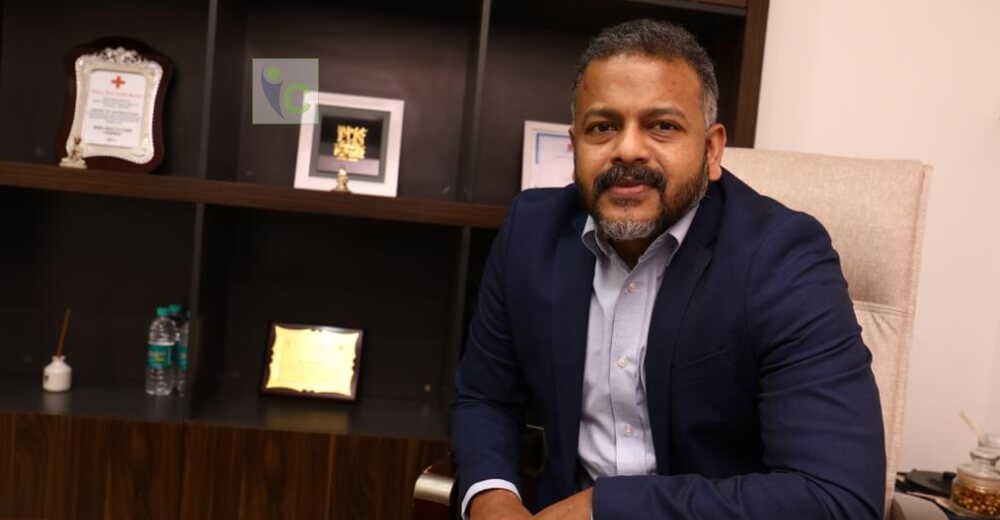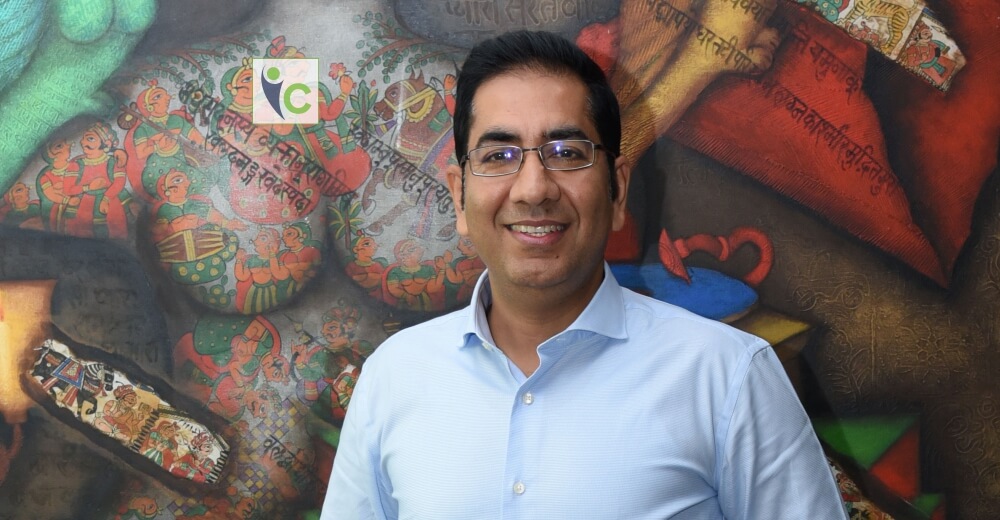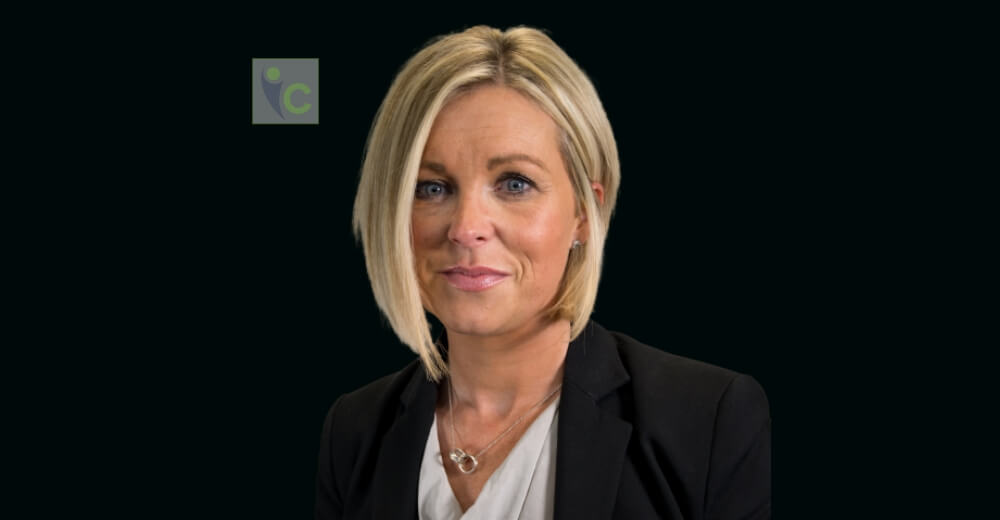Some people make life choices by themselves, whereas for some it comes as a blessing in disguise. Being born in a time where science students had two major options to choose a career from – an engineer or doctor, Harish Manian, CEO of MGM Healthcare, counted himself fortunate enough to have been selected into one of the best private medical schools in Kerala.
The same year, Harish was selected for an MBA (Hospital Administration) at the Institute of Management Studies, Indore, MP, which was among the first courses that were a blend of medicine and management and it was in collaboration with the University of Michigan. Harish found the course interesting and decided to pursue his studies further in this field.
Years later in 2019, having gained two decades of extensive experience in the healthcare management sector, Harish Manian stepped in as the CEO of MGM Healthcare leading the hospital to new heights by diligently following a patient-centric approach.
Read the following interview to understand the exciting journey of the dominant leader, and how under his leadership MGM Healthcare has created new milestones in the healthcare industry while ensuring the safety and comfort of the patients.
Give us a brief overview of your journey in the healthcare sector.
I started my professional career in 2001 as a Marketing professional with VIMHANS Hospital, New Delhi. I worked in Delhi for 4 years and in 2004, I joined Manipal Hospital, Bengaluru as Head of Telemedicine and New Initiatives.
In 2006-07, I got my first P&L role as Unit Head for Manipal Specialty Hospital, Bengaluru, post which I managed one more Asset for Manipal Hospital. I moved to Fortis in 2009 and managed two of the assets for Fortis in Bengaluru and Chennai. I was in Fortis till 2015 as the Director and moved on to Parkway Pantai to manage its assets in Hyderabad/Chennai and Bengaluru as Regional COO.
In 2018, I moved on to Everstone Capital as Operating Partner, in which we did a major deal of Sahyadri Hospitals, Pune. I joined MGM Healthcare in late 2019 where I currently serve as the CEO.
Tell us more about MGM Healthcare, its vision, and the key aspects of its stronghold across India.
MGM Healthcare was conceptualised by Dr Prashanth Rajagopalan with the primary vision of being the most preferred healthcare institution for patients, partners, and the community worldwide. And we could achieve and live this dream every day through our commitment to the highest standards of ethical practices and values, an exceptional team of medical experts, and professionals who consistently deliver quality healthcare, an ecosystem that encourages and invests in advanced medical practices and research, and through our ability to deliver exceptional value to all our stakeholders. Our core mission is to improve lives through outstanding healthcare and deliver exceptional patient outcomes with better patient experience.
Over the past two years, MGM has grown to become one of India’s most preferred centres for medical tourism. We currently run one of the country’s largest heart-lung transplant programmes. We are the youngest hospital to have performed all solid organ transplants within the first year of our existence.
We have become a national referral centre for ECMO therapy for post-COVID lung damage, with 14 ECMO machines. During the pandemic, we not only performed Asia’s first Berlin heart implantation (a total artificial heart) on a 2-year-old Russian child, but we also performed the most number of COVID-damaged lung transplants in this part of the world.
From a business leadership perspective, what is your opinion on the impact of the current pandemic on the health and wellness sector?
I think the greatest impact the pandemic has had on our nation is that it has brought the focus back to healthcare. This year, there has been an increase in budget allocation for the healthcare industry as well. This is a good sign as people are thinking progressively about the industry as an integral part of a country’s socio-economic development.
But when compared to other countries, India spends probably the least on healthcare as far as GDP is concerned. The government and the people need to start looking at health more seriously. But I think to post the pandemic, people are now starting to question if our health systems are viable.
The other aspect in which the pandemic impacted the industry is hand hygiene compliance. Hand hygiene compliance has now become 100%, earlier we used to have a lot of issues regarding hand hygiene compliance. We are now in our cleanest time ever because people are washing their hands regularly and cleaning regularly to avoid any cross-contamination.
The third way the pandemic has impacted the healthcare sector is in the investment of technology. Any hospital group that invested in technological platforms like telemedicine got a head start when COVID hit. They straight away started using the platform more aggressively. The largest amount of angel investments during this time has been in telemedicine and other tech platforms in healthcare. It has positively impacted people by showing how technology has been able to deliver healthcare till the last mile.
What is your opinion on the necessity for hospitals to improve their offerings, especially when it comes to catering to the ever-evolving patient needs and preferences?
Being a young organisation, it was easier for us to change course and act at a faster pace based on the ever-evolving patient needs and preferences. We have been rather nimble-footed. I believe being technologically advanced is one of the keyways to improve our offerings to patients.
Healthcare used to have the least amount of technological adoption because people couldn’t perceive an ROI for technology in healthcare. But that has changed. Technology is now the way to better clinical outcomes and patient experiences.
Then there is hiring exceptional talent. We have some exceptional clinical talent who have helped us gain national recognition. And all our medical staff are provided with the best equipment out there, including protective equipment. Likewise, our priority has been to ensure that we give our staff the best equipment so that patients benefit from their best service.
In your opinion, what could be the future of the healthcare sector post the pandemic? And how are you strategizing to scale your operations and offerings to be prepared for that future?
I think people need to slowly start returning to hospitals. With the vaccine now available, people are getting more confident to step into a hospital. I hope the scenario will be far better in the first quarter of the next financial year. Travel too is becoming easier. India is very bullish about medical tourism. That’s one sector that will recover well soon.
The past year has seen an acceleration in research and development space, especially related to drug and vaccine production. The health tech sector has also seen a rising demand for automation. We are currently investing in technologically advanced ICU charting solutions so that the patient monitoring is automated and accurate, diagnosis is faster and the scope for human error and chances of cross-contamination in critical cases is minimised.
I think better infrastructure, especially in Tier II and III cities should also be on the cards now. People living in areas outside the main cities did not have access to good healthcare. Affordable private healthcare is also a necessity in a post-COVID world as it was obvious that government institutes alone could not handle the numbers.
If given a chance, what is the one thing that you would change about the healthcare sector in India?
One thing I would like to change is how the nursing workforce is viewed from here on out. I believe that the pandemic has brought out the importance of nursing in healthcare, which was always undermined. The most respected workforce today should be nursing because of the way they stood resolute in the face of all the challenges brought by the pandemic. There has been so much emphasis on the doctors during this time, but I feel that the heroes of this pandemic were the nurses.
Working in those PPEs is a whole other challenge. Incidentally, hospitals had done the maximum number of recruitments during the pandemic, there was exceptional hiring on the nursing side. We went from 400-odd nurses to over 550. I think there will be some new-found respect for the nursing staff post-pandemic because they are the ones who stood by each patient, every day.
As an established leader, what would be your advice to the budding entrepreneurs and enthusiasts aspiring to venture into the healthcare sector?
The most satisfying business in today’s world is the healthcare business. The reason being, we bring a tangible difference to people’s life when they need it the most. Healthcare is a rewarding business provided you have the patience and a product that has its unique selling proposition.
Even a simple idea of digitising the doctor’s prescription has huge opportunity and uptake by major hospitals. Healthcare business models have gone the retail way almost a decade ago. People have experimented with various standalone single-speciality hospitals to large format Medicity projects. All of them have seen different transition phases and tasted success.
I feel this is the best time to ride the healthcare wave. We are at the cusp of inflection where the industry will see a lot of consolidation and tech innovation. Virtual hospitals will soon become a reality with transformational tech, like AR and VR, coming into healthcare.
All of this coupled with Robotic Automation, Artificial Intelligence, and Machine Learning, the next decade of healthcare is going to be action-packed and in business terms, the ‘Cash Cow Business’.
What are your views on the adoption of modern technology in healthcare?
Evolution is a key process for any industry. For the past few years, technology has been impacting in several industries, including healthcare, at a rapid rate. Innovations and employing the use of AI, ML, and IoT in bettering healthcare is where the future of this industry is at. In 2004, I was the Head of Telemedicine at Manipal Hospital. Back then, no one opted for this form of technology as it was odd to see your doctor through a screen when you could just visit them in person. But it was already well-established in countries like the US.
Today, almost every hospital worldwide has invested in telemedicine because of pandemic. People are preferring to use the service even now because it is more convenient. Cleveland did a study where they found that 50-60 ailments don’t even need you to physically visit the doctor, teleconsultation is enough. Even patients like those needing regular dialysis, who need regular follow-ups, can stay connected online with their physician.
Robotics is another avenue of health tech. We see it employed in cutting-edge surgical and interventional equipment, ensuring more accurate procedures and minimising recovery time. We are heavily investing in more technology, innovations, and health tech platforms to stay updated and ensure the patient receives the best there is.
We are investing in technology that is at least ten years ahead of its time. This technology will continue to evolve at a constant pace. Everything is available at the tip of your fingers today, whether you are a patient accessing your medical records online or a doctor who is using the technology to make accurate diagnoses and deliver accurate treatment.














